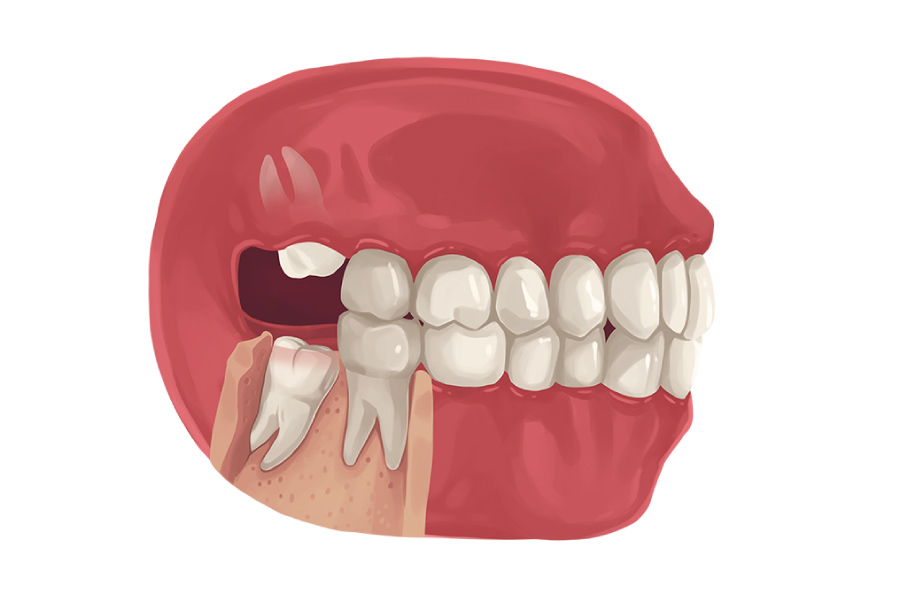NO! Extraction of wisdom tooth does not affect the eyes. It is a popular myth. As all the nerves and muscles of the body are connected to each other, it is a common misconception that wisdom tooth extractions injures the nerves or causes vision loss, but the ophthalmic nerve getting affected is the rarest of rare complication.

What are Wisdom Tooth?
Wisdom teeth also called third molars are the last set of teeth that grow in the jaw. They usually erupt (break through your gums) between the ages of 17 and 25. Sometimes, wisdom teeth erupt in alignment with other teeth in the mouth and don’t cause any problems. Other times, Wisdom teeth usually become impacted when the jaw doesn’t have enough space to accommodate all the teeth. Sometimes, a tooth may erupt at the wrong angle, become either partially or fully trapped in your gums or jawbone. This is referred to as impaction. Impacted wisdom teeth can cause a variety of oral health problems, including cavities, gum disease and infection with pain and swelling.
Impacted wisdom teeth are extremely common. According to the American Academy of Oral and Maxillofacial Surgeons, 90% of people have at least one impacted wisdom tooth.
What are the symptoms of impacted wisdom teeth?
Sometimes, impacted wisdom teeth don’t cause any noticeable problems. Other times, symptoms may develop suddenly or gradually over time. Signs of impacted wisdom teeth include:
.Pain or swelling of gums, jaw or face.
.Red, swollen or bleeding gums.
.A bad taste in your mouth.
.Bad breath (halitosis).
.Difficulty in opening the Mouth.
When is Wisdom Tooth Extraction necessary?
. If the wisdom tooth is impacted and does not have any space in the jaw to erupt, or it may be partially erupted.
. Pain and discomfort, which is long standing and radiates around the other teeth, and extends to the ear and head.
. Food lodgement around the partially erupted tooth may cause the decay, periodontal problems, foul smell etc.
. If eruption is causing the crowding of the teeth or it causes other orthodontic problems.
. Cyst formation near the erupting or impacted tooth.
Does Wisdom Tooth Extraction cause Vision Loss?
Wisdom Tooth Extraction is one of the most common dental surgeries performed. Vision loss after extraction of wisdom tooth is a complete myth .According to a research in the Journal of Oral and Maxillofacial Surgery, Vision loss after dental extraction is an extremely rare complication that occurs in less than 0.01% of cases. 50% of individuals who reported the infrequent occurrence of vision loss recovered part or all of their vision within six months.
Nerves and blood vessels in face and jaw are interconnected, but there is no direct pathway between the wisdom tooth and optic nerve that control vision. Temporary symptoms like blurry vision, mild discomfort, dizziness or eye strain, light sensitivity may due to medications or local anaesthesia or post operative swelling but permanent vision loss is extremely rare and not directly caused by the dental procedure.
The clinical implication indicate that delivery of local anesthesia must be done with aspiration before and during the injection. This will prevent intravascular injection of local anaesthetic, that in rare cases may lead to fluid emboli occluding the opthalmic artery which can result in vision loss.
Note: If you are experiencing pain, swelling, or discomfort due to wisdom teeth, its time to consult a dental expert. At Solitaire Family Dentistry, our experienced dental team ensures a safe and comfortable wisdom tooth extraction procedures using the latest techniques and equipment with personalised care and post operative guidance for a quick recovery.
